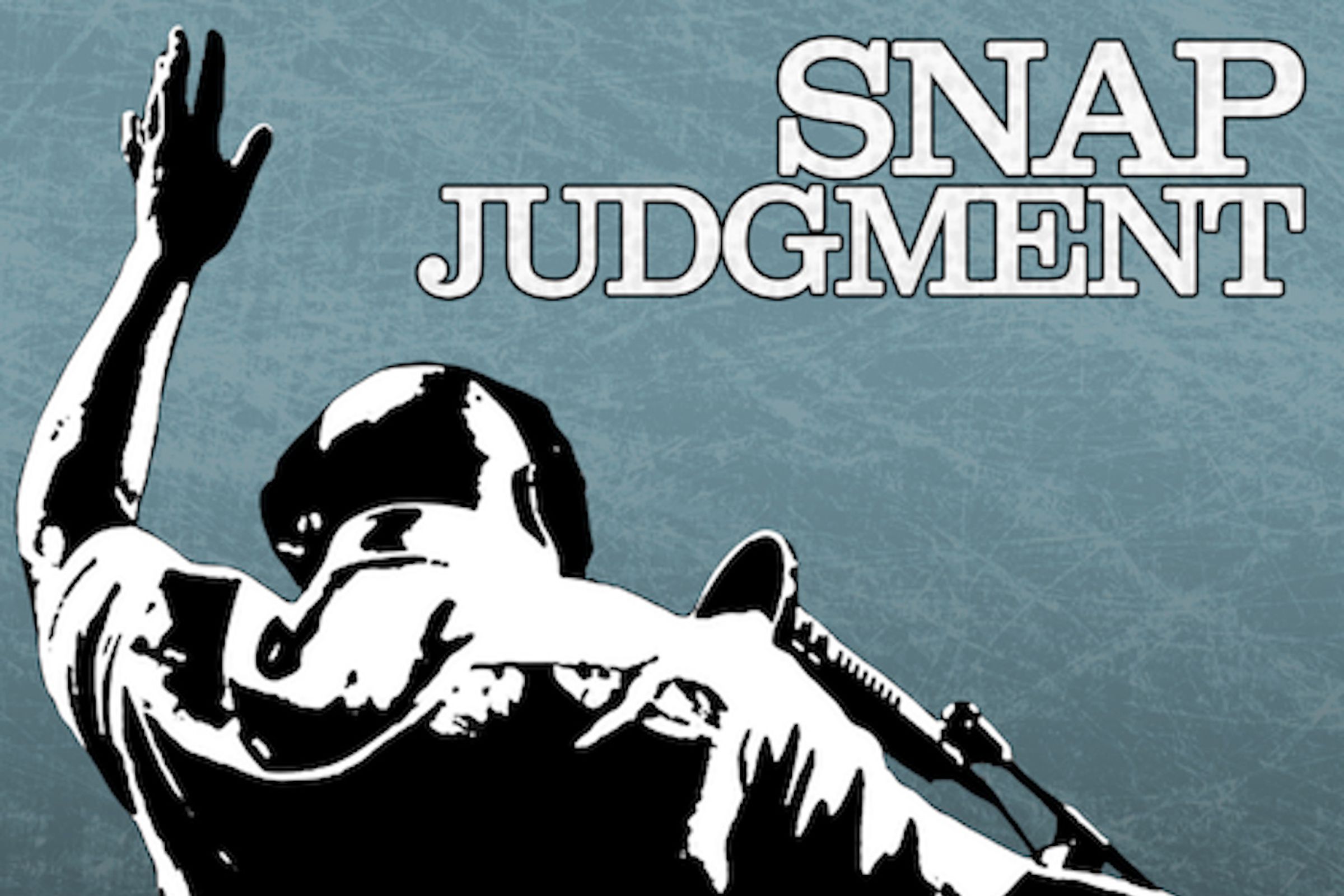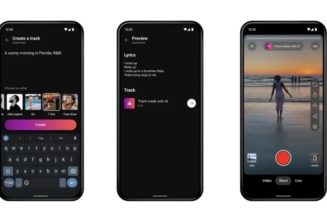Public radio makes another high-profile podcast acquisition.
Share this story

This is Hot Pod, The Verge’s newsletter about podcasting and the audio industry. Sign up here for more.
Got a very packed issue of Hot Pod for you today. To start off, I have a scoop for you about KQED’s acquisition of Snap Judgment Studios, which produces the shows Snap Judgment and Spooked. I’ll also dive into why Apple Podcasts got fined by a court in Moscow. Also, Audacy held an earnings call last week but very much kept it on the down low — I’ll break it down below.
Finally, be sure to check out my story in The Verge about The Unwell Network, a new Gen Z-focused podcast venture by Call Her Daddy’s Alex Cooper. Cooper’s controversial podcast often gets criticized for being light on substance — but the show regularly beats Joe Rogan’s podcast in the rankings. Now Cooper is looking to turn TikTok stars and influencers into podcasters. We’ll see how that goes.
An Oakland public radio favorite is coming home. The Bay Area’s KQED, an NPR and PBS member station, has acquired the Oakland-based Snap Judgment Studios, Hot Pod has learned. The acquisition includes the studio’s titular podcast series and public radio program, Snap Judgment, and the podcast Spooked.
Hosted by Glynn Washington, Snap Judgment has had a couple of homes so far — the public radio program was formerly under WNYC and then PRX. The weekly show, which airs on over 460 NPR stations across the country, will still be distributed by PRX. As will Spooked, a podcast about supernatural stories first launched by Snap Judgment Studios in 2017. Under the agreement, the whole of Snap Judgment Studios (which produces both shows) has become a part of Snap Studios LLC, a subsidiary of KQED.
“Our new KQED partnership allows us to dream bigger than ever about the future of Snap storytelling. We are thrilled to take listeners into worlds they haven’t even imagined,” Washington wrote to Hot Pod in an email.
No layoffs will occur as a result of the acquisition, Washington confirmed to Hot Pod. He and Mark Ristich will continue to serve as executive producers of Snap Judgment Studios, while KQED will provide organizational support, including HR, legal, and audience intelligence. The studio expects to launch a game show-style podcast hosted by Lupita Nyong’o later this year.
Spooked is also planning on a live event tour, which kicks off on October 13th at the Fox Theater in Oakland.
Spooked was initially a part of the subscription podcast network Luminary, which put its exclusive podcasts behind a paywall. As we’ve seen with many of Spotify’s original productions, the exclusivity model for podcasts greatly limits their reach. Spooked left Luminary in April and partnered with both KQED and PRX to distribute, produce, and monetize the show, reported Bloomberg. According to Washington, taking Spooked public was always the plan. The show, which focuses on an encounter with the supernatural in every episode, regularly ranked as the number one most listened-to title on Luminary’s network.
In a phone conversation with Hot Pod, Washington and KQED’s chief content officer, Holly Kernan, said the acquisition was an intentional move to keep both shows in the public sphere. As corporations like Spotify scale back their spending on narrative, journalistic podcasts, public radio offers a natural home for such content.
“I mean, Snap is special. And we want to keep it in public media and not go commercial and not be behind a paywall,” Kernan said.
Washington says that Snap’s acquisition by a public radio station will let the studio maintain a sense of stability. “The media business, especially the podcasting business, changes every six months. It’s so hard right now to maintain an organization that wants to do deep-dive storytelling….We feared that if we had gone on to partner with a commercial organization, that type of work would have not been a priority.”
Public radio has been on a bit of a buying spree in recent years, acquiring local media properties and tech startups. Back in 2018, public radio stations WNYC, KPCC, and WAMU jointly acquired Gothamist — including LAist and DCist. Chicago Public Media last year bought the beleaguered Chicago Sun-Times, kicking off a partnership between the newspaper and CPM’s WBEZ Chicago radio station. After buying up LAist’s archives, Southern California Public Radio recently rebranded its 89.3 KPCC station to LAist 89.3.
While the acquisitions offered a lifeline to struggling properties, they don’t always work out. SCPR laid off more than 12 percent of its staff this year, and LAist Studios was forced to halt a number of its podcasts. A group of public radio companies, including NPR, WNYC, and WBEZ, bought Pocket Casts in 2018 — only to sell it to WordPress owner Automattic a mere three years later.
The Russian independent news outlet Meduza reported that its weekly news recap podcast, What Happened, along with a news podcast by independent Russian outlet Holod, was yanked from Apple Podcasts on August 5th — only to return to the platform a day later. The removal came two days after a Moscow court fined Apple roughly $4,274 for not deleting what it claimed was inaccurate information on Ukraine from its podcasts and apps. The court also fined Wikipedia for containing “false” information about the war in Ukraine, though Wikipedia has maintained that its information is well-sourced and accurate.
Hot Pod has reached out to Apple for comment on the incidents.
Meduza, as one of the few English-language Russian news properties not under state control, is a vital source of information on the country for those in the West. The outlet’s employees were forced to flee Russia last year following a Kremlin crackdown on independent reporting on the war in Ukraine. The operation’s headquarters is in Latvia, which allows it to publish freely. Back in January, the Kremlin banned Meduza completely and declared it an illegal and “undesirable organization.” The Russian news magazine Holod has reported about the murders of gay individuals in Moscow and St. Petersburg, as well as how Russian soldiers are selling cattle to afford military gear — all topics likely to draw the ire of the Kremlin. Last year, the country passed a law that would criminalize reporting inaccurate information on the Russian military and impose a maximum jail time of 15 years in prison for offenders. The law has caused a chilling effect on most in-country war reporting.
Apple has regularly complied with takedown requests from governments all over the world. The Information reported that Apple took down more than 47,000 apps to comply with new Chinese regulations on gambling and in-app purchases back in 2020. But the company has also removed apps related to human rights issues, privacy tools, the Hong Kong protests, Tibetan Buddhism, and other topics on the Chinese government’s request, a separate analysis by the Tech Transparency Project found. In Russia, more than 2,754 apps were missing from Apple’s App Store that were available worldwide as of November 2022, noted free speech advocacy group Great Fire. But it’s unknown how many of those apps were taken down due to government requests — developers may have removed them for unrelated reasons.
A number of apps have been deleted from the Russian App Store this summer, including Tinder, an app for the Boston Celtics, a number of VPN apps, a Toyota navigation app, and an LGBTQ social networking app, according to Great Fire’s database that documents Apple’s app removals. It’s important to note that the database doesn’t specify whether apps were removed due to the government’s request.
Audacy has seen better days. The company quietly posted its second quarter earnings last Friday, which indicated a dip in both digital and net revenue. It reported $298.5 million in net revenue for the second quarter, which is a 6.6 percent decline year over year. Revenue from both national and local spot advertising is down — national is down 16.6 percent from what it was last year.
The New York Stock Exchange suspended trading and began the delisting process for Audacy this summer, which the company is appealing. Last month, the radio company put its 1-for-30 reverse stock split into effect. Put simply, Audacy shareholders will own one share of class A or class B common stock for every 30 shares they held. On Monday morning, Audacy’s share price was $1.21 — which meets NYSE’s threshold for staying on the exchange.
“Second quarter net revenues were down 6.6% in line with our quarterly guidance, reflecting challenging ad market conditions. During the quarter, we saw accelerated growth across certain of our key performance metrics including radio revenue share, station audience ratings, and digital platform usage. We also made meaningful progress on our ad tech and ad product roadmap as we work to develop important new pools of digital demand and growth,” said Audacy CEO David J. Field in a statement provided to investors.
The company noted that $10.4 million in charges came from terminating one of its two largest podcast agreements. “In June, we successfully negotiated an early exit to an onerous Podcast ad representation contract, which resulted in a restructuring charge of $5.9 million in the quarter and the accelerated recognition of $4.5 million of prepaid content expense. We believe exiting this agreement will have a positive impact on our Podcast margins, without materially impacting our future Podcast revenue growth opportunity,” wrote the company in its earnings report.
Hot Pod has reached out to Audacy with more questions about the agreement and will update if we hear back.
Audacy began streamlining operations at Pineapple Street Studios and Cadence13 this April in an effort to cut costs. This was only a month after it signed a multi-year deal with Missing Richard Simmons podcast host Dan Taberski. In June, Pineapple Street Studios also formed a new leadership team — Bari Finkel and Je-Anne Berry now serve as co-heads, and Jenna Weiss-Berman (one of Pineapple Street’s co-founders) was tapped to head Audacy’s podcast division as executive vice-president. Max Linsky was promoted to senior podcast strategy for Audacy’s podcast division. The radio company also partnered with TuneIn last month, making its entire podcast library available on TuneIn’s platforms.
Just last week, Audacy laid off three employees from Pineapple Street Studios. “We are heartbroken to share that @AudacyCorp has chosen to layoff 3 of our @pineapplemedia union colleagues. We stand with our comrades impacted by this decision-3 hardworking talented people who have contributed deeply to our workplace, and whose absence will be harshly felt,” posted Pineapple Street Union on X / Twitter last Friday afternoon.









